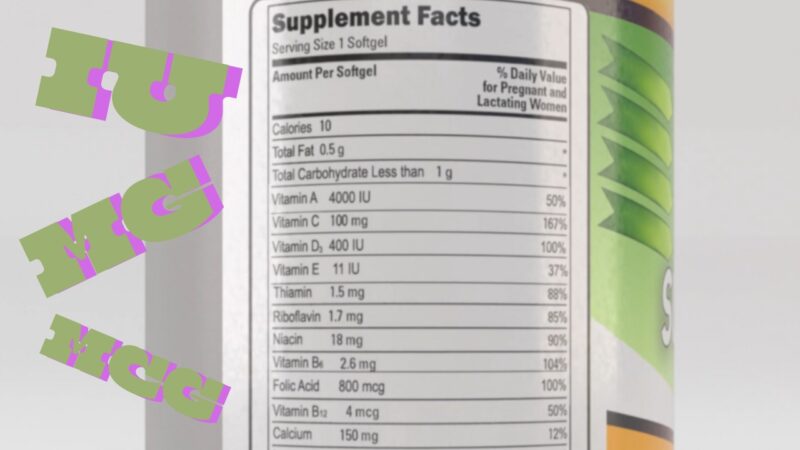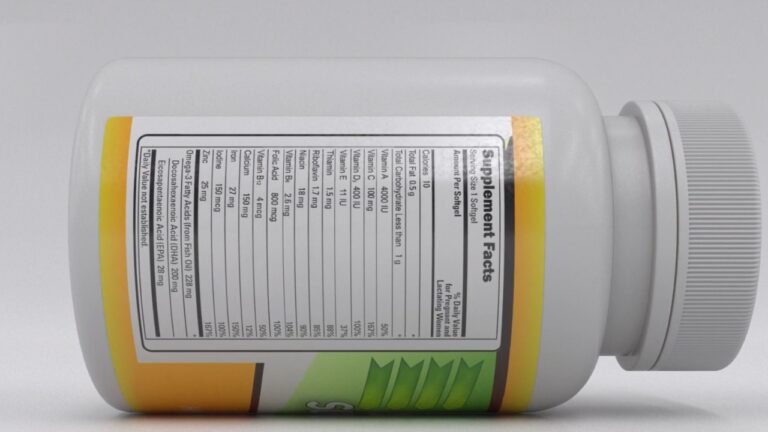Imagine you’re strolling down the pharmacy aisle, trying to follow your doctor’s advice to boost your vitamin intake.
As you scan the shelves, you notice some bottles labeled with “IU.” What on earth does IU mean?
You’re not a scientist or a healthcare expert, so this isn’t exactly familiar territory. Should you aim for higher or lower IUs?
And how do these measurements compare to the “mg” and “mcg” labels you see on other bottles?
If these questions are swirling in your mind, you’re not alone. IU isn’t a standard measurement most people encounter daily.
Keep reading to discover what IU means on vitamin labels and why it’s important.
Table of Contents
ToggleSo What Does IU Actually Mean?

IU stands for International Unit. It’s a measure of the biological effect a substance, like a vitamin or mineral, will have on your body according to cancer.gov. In simple terms, IU quantifies the impact a particular nutrient should have once it’s inside you.
This measurement is standardized globally, which means you’ll see it used consistently across different countries. Since it’s based on international medication standards, you can rely on it for accurate and comparable information no matter where you are.
IU in Vitamins
So, what does IU mean on vitamin labels? For vitamins and minerals, IU stands for International Unit. It indicates how much impact a particular vitamin will have on your body. IU measures how different forms of vitamins react in your body.
Take vitamin D, for instance. It comes as cholecalciferol (vitamin D3) and ergocalciferol (vitamin D2). Each form has a distinct effect on your body.
Similarly, vitamin A can be found as retinol or beta-carotene, and vitamin E as alpha-tocopherol or dl-alpha-tocopherol. These fat-soluble vitamins vary in their potency and biological activity. That’s why we use the IU standard to measure vitamin levels accurately.
What Does 5,000 IU Mean?

So, 5,000 IU doesn’t actually tell you how much something weighs. It’s not about mass or volume at all.
Here’s the thing: every vitamin supplement has its own level of how effective it is. The IU (International Unit) is all about measuring that effectiveness, not the weight or amount.
Imagine this: 5,000 mg of vitamin D3 will affect your body differently than 5,000 mg of beta-carotene. Those numbers don’t tell us anything about how effective they are according to Healthline. That’s why we use IU to get a standard measure of effectiveness.
Take 5,000 IU of Vitamin D3. It’s a pretty standard daily dose, especially for women who might have a slightly low level of vitamin D.
But 5,000 IU of beta-carotene? That’s way too much. Seriously, that much vitamin A can actually make you more prone to fractures
Are IU, MG, and MCG the Same?

Nope, IU isn’t the same as mg or mcg. Here’s a quick refresher: IU stands for international unit, mg means milligrams, and mcg is micrograms. Each of these units measures something different.
IU doesn’t measure mass or volume, whereas mg and mcg are all about mass. Plus, mg and mcg measure weight, but mg is a thousand times more than mcg.
When you’re checking out a vitamin label, take a close look to make sure you’re getting the right dosage.
Sometimes vitamin labels use IUs, while others use mg or mcg, which means you might need to do a bit of math. Or, if you’re lucky, the label will give you both the weight and IU values.
If you need to convert IU to weight, divide by the conversion factor.
But if you’re going from weight to IU, multiply by the conversion factor. Each vitamin has its own conversion factor because they vary in potency and biological effectiveness. So, each type of vitamin needs its own specific math.
1,000 IU Same as 1,000 MG?
Nope, 1,000 IU is not the same as 1,000 mg. There’s no vitamin or mineral out there with a conversion factor that makes these two values equal. So, they’re never going to be the same thing.
Given that, it’s super important to always check the conversion factors for the vitamins you’re thinking about. Look at the label on the bottle – it often has the conversion info you need. If it doesn’t, just do a quick online search before you buy your vitamins.
Bottom Line

IU stands for International Unit, which is a way to measure things like vitamins, hormones, enzymes, and other medical products. Unlike the metric system that measures weight, IU measures the biological activity of different substances.
Basically, it’s a measurement of how much you need of something to feel its effect. This is especially handy for vitamins that come in various forms, as their strength can differ.
However, it’s important to be cautious with dosages, as it is possible to eat too many vitamin gummies, leading to potential health issues.
Typically, IU is used for fat-soluble vitamins, which include vitamins A, D, E, and K. Vitamin A is great for eye health and overall growth and development. Vitamin D, also known as the “sunshine vitamin,” is key for bone health and supports the immune system. Vitamin E acts as a strong antioxidant, and vitamin K is crucial for blood clotting.

